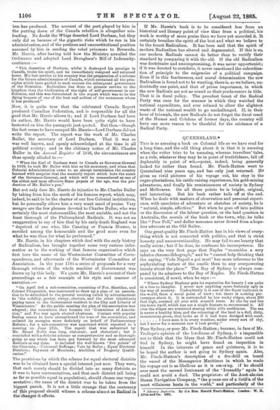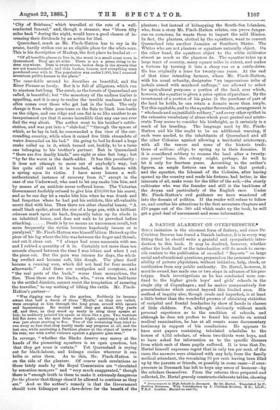QUEENSLAND.• Tilts is as amusing a book on Colonial life
as we have read for a long time, and the odd thing about it is that it is amusing when the writer tries to be amusing, whereas travellers' tales, as a rule, whatever they may be in point of truthfulness, fall off deplorably in point of wit,—point, indeed, being generally looked for rather than found. Mr. Fineh-Hatton went to Queensland nine years ago, and has only just returned. He gives us vivid pictures of his voyage out, his stay in the sugar-plantations, his cattle-raising experiences, his gold-mining adventures, and finally his reminiscences of society in Sydney and Melbourne. On all these points he is bright, original, and interesting. But his book rather tails off at the end. When he deals with matters of observation and personal experi- ence, with anecdotes of adventure or sketches of society, he is " natural, simple, effective." But when he goes off into politics or the discussion of the labour question, or the land question in Australia, the morals of the bush or the town, why, he talks like "Poor Poll," and duller nonsense never flowed from a hope- less advocate at the Old Bailey.
One great quality Mr. Finch-Hatton has in his views of every- thing which is not connected with politics, and that is strict honesty and unconventionality. He may fail to see beauty that really exists ; but if he does, he confesses his incompetence. He says on the very first page that Naples "" resembles a very inferior chromo-lithograph," and he " cannot help thinking that the saying, Vede Napoli e poi mori' has more reference to the asphyxiating nature of the smells than to any overpowering beauty about the place." The Bay of Sydney is always com- pared by its admirers to the Bay of Naples. Mr. Finch-Hatton is consistent, if novel, when he says :—
" Where Sydney Harbour gets its reputation for beauty I am quite at a loss to imagine. I never saw anything more forlornly ugly in the way of scenery. Undoubtedly it is one of the finest harbours in the world, from a naval point of view ; but there is nothing pic- turesque about it. It is surrounded by low rocky ridges, about 200 feet high, covered all over with stunted trees. At the far end lies the town itself, which has not a single feature to recommend it. All over the ridges are scattered staring white villa residences. The sea is never a healthy blue, and the colouring of the land is a dull, dirty, monotonous green, that looks as if it had been dredged with sand.
I have seen it in every weather, under every sort of sky, but I never for a moment saw it look pretty."
Poor Sydney, or poor Mr. Finch-Hatton; because, in face of Mr. Trollope's opinion of the loveliness of Sydney, it s impossible not to think that the blues that Mr. Finch-Hatton could not find in Sydney, he might have found on inspection in himself. In the interests of peace and quietness, it is to be hoped the author is not going to Sydney again. Also, Mr. Finch-Hatton's description of a fire-drill on board the vessel of the Messageries Maritimes in whieh he made his voyage out is as libellous as it is amusng. If he should ever meet the second lieutenant of the Ironaddy ' again he could not avoid a dueL The proprietors of the Ansa. alasian Steam Navigation Company, "the psssevors of a flotilla of the most villainous boats in the world," and particularly of the • Advance Australia. By tie Hen. Harold Finch-Fatten. London : W. H. Alley and On. WA.
' City of Brisbane,' which travelled at the rate of a well- conducted funeral," and, though a steamer, was "blown fifty miles back " during the night, would have a good chance of in- creasing their dividends by an action for libel.
Queensland, much as Mr. Finch-Hatton has to say in its praise, hardly strikes one as an eligible place for the white man. This is his description of Mackay, the first place he landed at :—
" Of all horrible places to live in, the worst is a small coast town in Queensland. They are all alike. There is not a green thing to be seen any where. Dust is everywhere, inches deep in the streets that are not macadamised ; and thus bushes, houses, and everything were powdered over with it. The population was under 1,000, but I counted seventeen public-houses in the place."
The cane-fields around he describes as beautiful, and the River Pioneer as lovely. But it is full of alligators, which run to nineteen feet long. The scrub, as the forests of Queensland are called, is beautiful ; but "the monotony of the endless timber is appalling, and it is easy to realise the terrible madness that so often comes over those who get lost in the bush. The only change is from white gum-trees on the flats to black iron-barks on the ridges, and one ridge and one flat is so like another to an inexperienced eye that it seems incredible that any one can ever find the way about. The author went to his brother's cattle- station, and was pat into a "slab-hut," "through the spaces of which, as he lay in bed, he commanded a fine view of the sur- rounding country, while when it rained five little streamlets of water descended on his bed." On going to bed he found a huge snake coiled up in it, which turned out, luckily, to be a tame one belonging to his brother's partner. But in Queensland " there are five deadly kinds," one eight or nine feet long ; but "by far the worst is the death-adder. It has this peculiarity : it does not attempt to move oat of anybody's way, but lies quite still until it is touched, when it fastens with a spring upon its victim. I have never known a well- authenticated instance of recovery from it," except in the case of one Underwood, who used to let any snake bite him, and by means of an antidote never suffered harm. The Victorian Government foolishly refused to give him £10,000 for his secret, and as he one day let a snake bite him when he was drunk and had forgotten where be had put his antidote, this all-valuable secret died with him. Then there are other cheerful beasts. "A small black spider, about the size of a large pea, with a brilliant crimson mark upon its back, frequently takes up its abode in an inhabited house, and does not wait to be provoked before
attacking Death is by no means an uncommon result, but more frequently the victim becomes hopelessly insane or is paralysed." Mr. Finch-Hatton was himself bitten. He took up the piece of his leg where the bite was between the finger and thumb, and cut it clean out. "I always had some ammonia with me, and I rubbed a quantity of it in. Certainly not more than ten seconds elapsed between the time I was bitten and when I cut the piece out. But the pain was intense for days, the whole leg swelled and became soft, like dough. The place itself became a running sore, which did not heal for four months afterwards." And there are centipedes and scorpions, and "the real pests of the bush," worse than mosquitoes, the flies. Then there are the blacks, who, " even when half-tame in the settled districts, cannot resist the temptation of spearing the traveller," to say nothing of lifting the cattle. Mr. Finch- Hatton's partner— "Was digging one day in the garden. Suddenly be became aware that half a dozen of these as they are called, were creeping at him through the long grass, armed with spears and boomerangs. Be waited until they got about fifty yards off, and then, as they stood up ready to sling their spears at him, he suddenly pointed his spade at them like a gun. Two warriors fell flat down on the spot from sheer fright, upsetting a third who was just about starting to flee. Two of the remaining then tried to run away so fast that they hardly made any progress at all, and the last one, while scattering a Parthian glance at the object of terror in his rear, ran with awful violence against a gigantic gam-tree."
In revenge, " whether the Blacks deserve any mercy at the hands of the pioneering squatters is an open question, but that they get none is certain." Yet Queensland is crying out for black-labour, and kidnaps coolies wherever it can bribe or seize them. As to this, Mr. Finch-Hatton is on the side of the planters. Of course such revelations as those lately made by the Royal Commission are " circulated by sensation-mongers" and " very much exaggerated," though there is " enough truth in them to make it extremely dangerous for the planter that things should be allowed to continue as they are." And so the author's remedy is that the Government should tarn kidnapper and slave-driver for the benefit of the planters ; but instead of kidnapping the South-Sea Islanders, who, from a story Mr. Finch-Hatton relates, can prove danger- ous on occasions, he wants them to import the mild Hindoo. In fact, the planters, abetted by the squatters, want to convert Queensland into another Jamaica or Southern States. The Whites who are not planters or squatters naturally object. On the other hand, the squatters object to the white cultivator almost as mach as the planters do. The squatter takes up a large tract of country, many square miles in extent, and makes a fortune by turning it into a sheep ran or a cattle-drive. He has originally a lease for twenty-one years. At the end of that time intending farmers, whom Mr. Finch-Hatton, with his usual urbanity, designates "an impecunious tribe of jackals armed with manhood suffrage," are allowed to select for agricultural purposes a portion of the land, over which, however, the squatter is given a prior option of purchase. By the investment of a portion of his gains in the purchase of part of the land he holds, he can retain a domain •more than ample. Yet this equitable, and to the squatter favourable, arrangement is " wholesale and unjustifiable robbery," and every other epithet in the extensive vocabulary of abuse which your genteel and aristo- cratic Tory seems to consider his birthright, as it certainly is a mark of his breeding. The language used by Mr. Finch- Hatton and his like ought to be an additional warning, if such were needed, to the inhabitants of Queensland and all the other Colonies against allowing a territorial aristocracy, with all the venom and none of the historic tradi- tions of noblesse oblige, to spring up in their domains. If it is considered robbery to resume the land after a twenty- one years' lease, the colony might, perhaps, do well to let it only for fourteen years. According to the author's figures, an ample fortune can be made in that period ; and the squatter, the Ishmael of the Colonies, after having opened up the country and made his fortune, had better, in the interests of all, make room for the tiller of the soil,—the sturdy cultivator who was the founder and still is the backbone of the Aryan and particularly of the English race. Under Mr. Finch-Hatton's evil guidance we have wandered off into the domain of politics. If the reader will refuse to follow us, and confine his attentions to the first seventeen chapters and 270 pages out of the 380 odd which make up the book, he will get a good deal of amusement and some information.



































 Previous page
Previous page